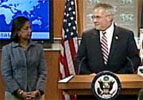
After coming under intense pressure from Sudan advocates – from grassroots across the U.S., to Sudan watchers in Congress, to proponents within the Obama administration of a tougher stance – administration officials laid out a series of incentives to entice Sudan’s ruling National Congress Party to allow a credible referendum in the South and make post-referendum arrangements with the southern semi-autonomous government. If preparations stall or if the NCP meddles in the referendum or its aftermath, Khartoum could face additional sanctions.
The substance of the offer may not be much different from what the Obama administration has put forth all along; the incentives and pressures alluded to by State Department officials at the unveiling of the new Sudan policy last year were never made public. And again, the incentives part of the package has been emphasized over the pressures. But who is doing the offering is significant.
This past week has seen a blitz of meetings and interviews on Sudan from top Obama administration officials. Secretary Hillary Clinton and National Security Advisor James L. Jones made phone calls to Sudanese leaders to press for movement on negotiations. Fresh from a trip to the North and South, the president’s special envoy briefed reporters at the State Department, calling it a “make-or-break period for Sudan.” U.S. Ambassador to the United Nations Susan Rice told NPR’s "All Things Considered:"
“There are no get out of jail free cards here. The government of Sudan and indeed the leadership of South Sudan have to meet a very clear set of benchmarks with regard to the North-South agreement and Darfur. Only in that context will there be benefits that accrue from the United States, and should they fail to, obviously we’ve been clear that consequences remain on the table.”
The Washington Post reported that the Obama administration has held daily interagency meetings on Sudan for the past two weeks. It’s all in preparation for President Obama’s first direct interaction with Sudanese leaders since taking office; next week he will meet for an hour with Sudan’s Vice President Ali Osman Taha and South Sudan’s President Salva Kiir on the sidelines of the U.N. General Assembly.
Undoubtedly, this recalibration also came from the realization that having its dedicated but inexperienced Sudan envoy publicly push an incentives-heavy approach isn’t having the desired result. Key logistical preparations for the January 9 referendum remain undone, and little progress has been made to sort out arrangements for how North and South will deal with questions of citizenship, oil sharing, and economic cooperation, to name just a few of the contentious issues.
But whether the stepped up diplomatic effort will be enough or in time is an open question. By going public with incentives, the administration opened the door to the NCP’s rejection of their offer. "We reject charity from anyone,” said Bashir advisor Ghazi Salahuddin. “Whatever is our right we should we take and whatever is the right of others they should take," he said.
Senior NCP official Rabie Abdelati balked at the idea that the Americans would offer incentives for progress and roll out consequences for stalemate. “If somebody is saying they will do what’s agreed upon there’s no need to say to him I am warning you,” Abdelati told Reuters. He said the NCP is committed to holding the referenda in the South and Abyei on time.
It is precisely this commitment in word and not deed that the increased, high-level involvement of the Obama administration seems to acknowledge.
President Bashir and his NCP, which has been in power since 1989, are notorious for signing agreements and failing to implement. The various iterations – and still no resolution – of the North-South boundary at Abyei are a case in point. The Comprehensive Peace Agreement called for the border to be defined within six months, but that deadline quickly came and went. Most recently, despite having voiced acceptance for the most recently drawn border – handed down in a ruling by a tribunal in The Hague in July 2009 – the border has not been demarcated on the ground. The NCP has now suggested the demarcation must be complete before the referendum but has continuously stalled on creating the commission that will prepare for the Abyei referendum.
Soldiers from North and South in the region and competing ethnic groups there have taken an increasingly belligerent posture as Abyei’s own referendum on January 9 draws near. Sudan analysts speculate that the type of border and its location may become “bargaining chips in a grander set of trade-offs” in negotiations over post-referendum arrangements, an eventuality that could prove explosive in a heavily armed region where people have long awaited the chance to decide their own future.
Neither has southern Sudan’s ruling party made much progress on the logistical tasks necessary for its people – spread across a vast territory with few roads and low levels of education – to participate in a credible vote for self-determination in less than four months time. In addition, southern leaders showed alarmingly repressive tendencies during and after the April elections, which many saw as a dress rehearsal for the referendum.
In short, with all that remains to be done to prepare for the monumental referenda in January and a smooth transition period following the vote, high-level engagement by the United States couldn’t have come soon enough. Having waited until the last moment to test out its diplomatic surge, even administration officials admit that success is far from sure. “There’s no guarantee” that President Bashir will accept the southern referendum, said Ambassador Rice. “We’re at a very precarious moment.”
President Obama’s long awaited meeting with Sudanese leaders next week will set the stage for whether this U.S. administration is seen as a credible arbiter in Sudan for the next 100 days and beyond.
Photo: Special Envoy Gration and Ambassador Rice at Sudan policy launch, October 2009 (State Dept.)

